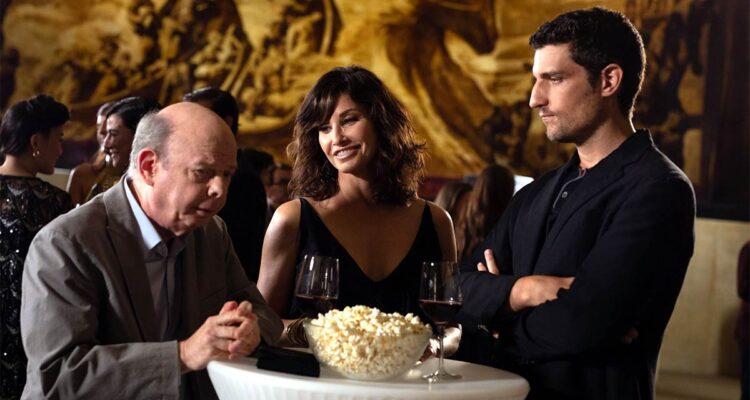Woody Allen’s decade-long downward spiral began after making “Midnight in Paris” in 2011 and following it up with a series of movies ranging from bad to worse to worse than that: “Irrational Man,” “Wonder Wheel,” “Cafe Society,” “A Rainy Day in New York.” At least we have the minor gift of “Blue Jasmine,” a comparatively fine movie according to the pathetic standard set by the rest, to counterpoint the nearly annual stream of Allen’s shrugging dross, but the emphasis is on “minor.” What a difference a change in era made for one of American cinema’s most influential directors. (This disregards the cycle of renewal of Dylan Farrow’s sexual abuse allegations against him, a battle without end waged in the media where nobody wins, her least of all.)
READ MORE: The 100 Most Anticipated Films Of 2022
“Rifkin’s Festival,” Allen’s latest, now arrives in theaters after its original release date (November 2020) was delayed by the COVID-19 pandemic, a fate suffered by countless other films but few where the delay feels like a mercy. For equity’s sake, there are small pleasures to savor here; the picture breezes by, hinges on a twitchy Wallace Shawn performance, and looks lovely, as pictures shot by Vittorio Storaro tend to be. But the connective tissue binding these parts together is stale, atrophied, tossed off with a casual apathy that Allen partisans may call “effortless.” It’s true that Allen, whatever you think of him as a person, is one of America’s master filmmakers; without him, cinema as we understand it wouldn’t be the same. Erase Allen and you lose gifted directors all the way up to Desiree Akhavan. But it is unimpeachable that he put his best days behind him well before “Midnight in Paris,” a wonderful fluke in retrospect.
“Midnight in Paris” is a nostalgia picture where romantic idealization over bygone times is interrogated through magical realism; the film isn’t itself nostalgic for decades none of us watching today were alive for, and hits on profound insights about the type of person who does indulge in daydreams of periods past. “Rifkin’s Festival” has all the nostalgia with none of the clear-eyed perspective, playing like Allen’s visualized all-timer list. We get it: He likes Federico Fellini, Ingmar Bergman, François Truffaut, Jean-Luc Godard, and Luis Buñuel films. Good for him. As critic and professor Mort Rifkin, Shawn, the film’s Allen surrogate, pines for these artists’ heydays and laments the state of the current cinema, which by his own wisdom is shallow. Considering the source, the sentiment is rich.
Mort spends “Rifkin’s Festival” moseying about San Sebastián while his wife, Sue (Gina Gershon), handles publicity for the new film by Philipe (Louis Garrel), the hot young auteur everyone’s raving about – except, of course, for Mort. Philipe lusts after Sue, who lusts after Philipe, while the resigned Mort grouses, kvetches, and would you believe it, courts a woman who’s even younger than Sue, a doctor named Joanna (Elena Anaya). Mort’s in fine health, so he feigns illness and injury to see her. Occasionally, he falls into reveries based around the aesthetics and films of those aforementioned cinema legends. There’s not much more to “Rifkin’s Festival” than that.
The setup, execution, and payoff are altogether self-serving. There’s no voice in the film to challenge Allen’s theses, which are admittedly muddled. Is he lampooning a certain breed of film critic? Does he identify with that critic? Is he holding the media accountable for lowering the character of film journalism? Or is he just entertaining another fantasy about dusty old men as potential love interests for women decades their junior? There’s no “there” in “Rifkin’s Festival,” just a string of complaints about the artform that Allen helped progress from the 1970s to the 1990s. Fair is fair: It may simply be that Allen has grown weary of the movies, whether he’s making them, watching them, or reading about them, and that “Rifkin’s Festival” is his salvo against them, wrapped around his love for them.
But there’s so little clarity to the film that even the smallest detail ends up validating its anti-contemporary notions. Joanna, like Mort, thinks Philipe’s film is bullshit. The way Philipe is written by Allen and played by Garrel, she and Mort likely have the right idea. Their gleeful collective disdain goes unanswered elsewhere in “Rifkin’s Festival” in a bumbling demonstration of begging the question. Fine; it’s Allen’s film. He can say what he wants. But there’s pretense in his railing against pretense. “Rifkin’s Festival” rapidly grows confused with itself, which weirdly comes off as proof of cinema’s vitality; movies are living, breathing things capable of arguing with themselves, and above all else that’s what “Rifkin’s Festival” does best.
Allen is at such an indifferent phase in his career that accepting the movie’s intertextual discourse as anything other than accidental is a joke. “Rifkin’s Festival,” like Sue’s affair with Philipe, Joanna’s own marital strife, or Mort himself, doesn’t matter. It’s a movie of no consequence. Allen, for his part, doesn’t seem to care, and if he does, the care never registers for even a moment. There’s only vain conceit. There’s little worse than listening to an aging cinephile soapbox about cinema’s glory days, unless the cinephile happens to be a guy like Allen, whose own glory days are stuck firmly in the last century. [D]
“Rifkin’s Festival” is in select theaters now.

